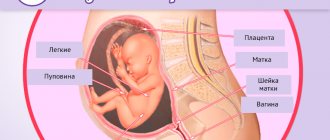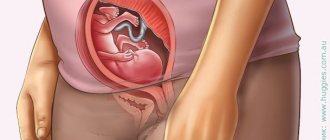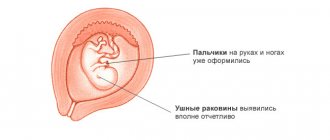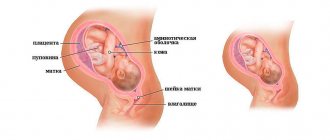Twenty-fifth week of pregnancy
Impending motherhood worries the expectant mother, but most often it appears in rosy colors.
Sometimes mood swings are observed, but this is quite normal, since the psyche may not yet adapt to its new position and may not know how to evaluate itself - as one organism or two. Over time, all fears will disappear, so you shouldn’t pay much attention to them. At the 25th week of pregnancy, the baby’s length is already approximately 30 cm, and the weight is approaching 700 g. Compared to what it was just a few weeks ago, the progress seems impressive, but this is not the limit. The fetal skeleton becomes stronger and longer, and muscle mass gradually increases. It is at this time that an important change is observed: in the child’s lungs the number of cells that are responsible for the production of surfactant increases significantly, which will subsequently give the child the opportunity to breathe independently. The development of the bone marrow is no less active, which by the 25th week of pregnancy is already ready to begin its work on the production of blood cells.
Twenty-fifth week of pregnancy
Childbirth at 25 weeks of pregnancy
Premature birth at 25 weeks is rarely recorded. In most cases, they are the result of prolonged exposure to negative factors on the fetus. Changes in the reproductive system can also cause a baby to be born prematurely. The born baby is placed in an incubator and connected to a ventilator.
A baby born at 25 weeks is viable, but the chances of survival are low. It all depends on the correctness of resuscitation measures and the availability of the necessary equipment.
Well-being of a pregnant woman at 25 weeks
For the expectant mother, at 25 weeks of pregnancy it is also an alarming time. The fundus of the uterus has already risen by 25 cm, and it is the measurement of this indicator that provides very important information about the development of the fetus. If the size of the uterus is normal, then the child’s development is absolutely normal, but if not, then this may be a sign of developmental delay. There can be many reasons for this condition, but most often it is placental insufficiency. Its prerequisites are prolonged toxicosis, the threat of miscarriage, and any viral infection, especially one with complications.
But this is far from the only complication that can await an expectant mother at 25 weeks of pregnancy. In some cases, the reverse process occurs when the size of the uterus exceeds the required size. Sometimes this indicates that there is not one fetus, but several, which happens in approximately 8% of cases. In addition, this can be caused by a large amount of amniotic fluid, which is associated with the presence of infection in the body. Sometimes this happens in cases where a woman has previously had abortions or miscarriages. A doctor will be able to determine polyhydramnios during a routine examination using an ultrasound, but an experienced specialist will be able to do this even during a routine examination, since the uterus will be tense and seem like a ball filled with fluid.
Anxiety in a pregnant woman at 25 weeks
25th week of pregnancy - during this period, many expectant mothers worry about premature birth.
But you shouldn’t stress yourself out and worry your head about it if there are no alarming symptoms. However, if you have a stomach ache during pregnancy, lower back tension, and watery vaginal discharge at 25 weeks, contact your doctor immediately. If you have not yet started preparing your nipples for feeding, now is the time to start. To do this, make it a rule to wash your nipples and nipple circles with cold water and wipe them with a rough waffle towel. This simple manipulation will allow you to protect yourself from such troubles as cracked nipples in the future. Carry out the procedure once a day for a couple of minutes, no more, so as not to cause unwanted uterine contractions during this period.
Heaviness in the legs during pregnancy and the manifestation of varicose veins are another unpleasant phenomenon that accompanies the expectant mother during this period. To prevent the development of the disease, it is recommended to wear special compression stockings, which a phlebologist will help you choose. Try not to strain your feet and wear comfortable maternity shoes. When resting, place your feet on a pillow or cushion to improve blood circulation and relieve tension.
Belly size
Some mothers have a miniature belly, while others seem oversized. If the child’s development is adequate for the duration of pregnancy, then the volume of the tummy should not bother you.
The growing uterus with the weight of the fetus puts pressure on neighboring organs: due to gastric contents entering the esophagus, heartburn occurs, the gastrointestinal tract cannot cope, constipation and bloating occur. To help a pregnant woman - fiber, as a kind of scrub for the digestive system, and laxative products: beets, prunes, yogurt. The bladder also suffers under the weight of the abdomen. Don't be patient and go to the restroom whenever you feel like it, no matter how often it happens. Constant runs to the toilet will soon end, and you will remember them with humor.
Due to the fact that the skin is stretched, the abdomen becomes covered with stretch marks. You won’t be able to avoid them, so accept them and try to at least reduce their intensity. Use pharmacy creams or gels against stretch marks. Do not massage your stomach intensely or use a dry brush!

Belly size
Risks at 25 weeks of pregnancy
The pregnancy period of 25 weeks refers to the quiet period of gestation. The risk of complications at this stage is minimal. The 25-week fetus is reliably protected by the placenta from external influences of unfavorable factors. However, the risk of complications cannot be completely eliminated.
Among the main threats of this period, doctors name:
- fetal freezing;
- abortion;
- premature birth.
How to eat at 25 weeks of pregnancy?
In order not to provoke heartburn and bloating, you should not overeat. Eat small and often, choosing tasty and natural foods. Wash vegetables and fruits thoroughly, as well as eggs before cooking. Remember hand hygiene.
Eat protein foods (dietary meat, eggs, beans), foods with iron (buckwheat, liver, apples, pomegranate), calcium (cheeses, cottage cheese, fermented baked milk, sour cream, milk). Try to drink at least 1.5 liters of clean water. Preferable drinks include birch sap, fruit drinks, compotes, jelly, and weakly brewed herbal tea; if you really want coffee, then only with milk or cream.
Do not eat fried and fatty foods, salty and spicy foods, and overly sweet and rich foods. If you really want the crunch of chips, eat just a handful or make homemade chips from pita bread or thin potato slices.

Nutrition at 25 weeks of pregnancy
Ultrasound at 25 weeks of pregnancy
At this time, the study is carried out only when indicated.
Ultrasound at 25 weeks is a rare examination that is prescribed in the following cases:
- with increased uterine tone;
- when monitoring the type of fetal presentation;
- when assessing the condition of the placenta if abruption is suspected.
Women who have complaints about their health are also referred for examination. Ultrasound often makes it possible to determine the cause of the disorder and determine what provokes pain in the lower abdomen. Poor test results can also be a reason for examination. Most pregnant women do not undergo an ultrasound at this time.
Feelings at 25 weeks of pregnancy
A pregnant woman’s feelings throughout pregnancy are very multifaceted. At week 25, they are due to the fact that the uterus continues to grow and puts more and more pressure on the internal organs. During this period, women may notice:
- More severe and frequent back pain due to increasing load and shifting center of gravity.
- Swelling of the lower extremities when walking or standing for a long time.
- The appearance of shortness of breath, which is associated with increased stress on the cardiovascular system.
- Discomfort when pushing the baby if the blow falls on the internal organs.
- Decreased vision clarity.
In intimate life, a woman may also notice an increase in sensitivity. Sexual intercourse brings more pleasure and more often ends in orgasm. This is due to blood flow to the pelvic organs and a general change in hormonal balance. Therefore, in the absence of contraindications, there is no need to limit intimate relationships.
Special courses for pregnant women will help you get a good sense of motherhood. There, a woman will receive basic knowledge about the process of childbirth, try to do permitted gymnastic exercises and find many new acquaintances with the same interests.
Feelings during pregnancy are not limited to physical changes. The woman’s psycho-emotional state is also corrected. Sometimes she wants to be alone, and at other times inexplicable activity may awaken. Mood swings are normal during this period. At week 25, pedantry, attention to detail and the demand that everything be done perfectly often appear. Thus, the body prepares for motherhood, heightening the sense of responsibility, care and purity.
During this period, a woman may feel that she is unable to eat a whole portion, despite the fact that the feeling of hunger has not disappeared. This is due to the fact that the uterus puts pressure on the stomach, reducing its volume. It is recommended to eat often, but little by little. You shouldn't overeat either. At week 25, normal weight gain for a pregnant woman is about 6.5 kg.
Nutrition at 25 weeks of pregnancy
Other weeks:
You need proper, satisfying and balanced nutrition. Eat protein every day. To prevent the development of anemia, add oatmeal, prunes, beets, bran, buckwheat, legumes, boiled beef and liver to your diet.
Reduce salt and sugar intake to a minimum. White wheat bread, buns and confectionery products are generally not very useful for anyone, and especially for you now. And there is no need for your baby to gain excess weight from sweets.
Your liver is now bearing an increased load. So don't force her to process preservatives, fatty foods, pickled foods, large amounts of spices and spicy foods. Try to drink more still water, compotes, and fresh juices.
In general, you are now very picky about the expiration date and freshness of products. Your sense of smell, undoubtedly heightened during pregnancy, is intended precisely for this by nature.
Discharge at 25 weeks of pregnancy
Do not forget to observe the nature of the discharge: any changes in vaginal discharge can tell you how well the pregnancy is going. Moderate discharge of a light gray or milky hue, uniform consistency, with a slight sour odor is considered normal for this period. The appearance of green, yellow, purulent, foamy or curdled discharge, discharge with an unpleasant odor, accompanied by discomfort in the form of burning and itching of the genital tract is a sure sign of an infection. In addition to changes in the nature of discharge, an increase in body temperature, chills, and painful urination can also indicate the development of an infection. Ignoring such symptoms is not only stupid, but also dangerous - the infection without proper treatment can affect the fetus in utero. Therefore, if you observe at least one of the above signs, immediately go to a doctor for examination. “Spotting” brown or bloody discharge that is not accompanied by pain and appears specifically after a gynecological examination or sexual intercourse with a spouse should also prompt a woman to decide to visit a doctor. There is no need to be scared or panic when such discharge appears: in this case, we will most likely talk about cervical erosion, but not about premature birth. However, this diagnosis can only be confirmed by a specialist after a proper examination. But the appearance of liquid, watery, yellowish discharge should be a cause for alarm: you are probably experiencing leakage of amniotic fluid. Whether the amniotic fluid leaks in portions and in small quantities, or pours out all at once, in any case, the woman is indicated for hospitalization. Moreover, a one-time rupture of amniotic fluid is a symptom of the onset of premature labor, and usually this phenomenon is also observed against the background of cramping abdominal pain, which also accompanies labor. But even if the amniotic fluid leaks slightly, only creating the effect of increased humidity in the genital area, and is not accompanied by any painful sensations, you should see a doctor as soon as possible. If the integrity of the membranes is damaged, the risk of infection of the fetus is increased, which is not sufficiently protected from the penetration of pathogenic microorganisms.
Pain at 25 weeks of pregnancy
By the way, back and lower back pain can really bother you now. Due to the continuous growth of the uterus, the center of gravity has shifted, the ligaments are softened and stretched, which causes pain in the lumbar region, back, and sacrum. Typically, doctors attribute pain of this nature to physiological manifestations and give advice on how to reduce these unpleasant symptoms. Among the tips: recommendations regarding wearing a special support bandage, using only chairs with a back for sitting, and following the rule of regularly unloading the spine. But at the same time, it happens that back pain, spreading to the sacrum and buttocks, lasts a long time and seems unbearable. And then there is every reason to suspect that a pregnant woman has such a phenomenon as sciatica, or lumbosacral radiculitis. When carrying a baby, this condition occurs as a reaction to the constant pressure of the fetal head on the pelvic bones, which, in turn, causes pinched nerves in the lower back. The pain in this case is localized in the lumbar region, in the sacrum, and even spreads to the buttocks and legs. There may also be symptoms of numbness or tingling in the legs. In order to alleviate this condition, you should choose a hard mattress for the bed, avoid prolonged sitting, as well as standing on your feet, and do not bend over unnecessarily. If the pain is severe, the doctor may consider a course of physical therapy necessary. The baby has already grown significantly, and now often takes the “rest against mom’s ribs” position. It is the little one’s tricks that explain the noticeable pain in the hypochondrium - when he not only rests with his strong enough legs, but also pushes his mother in the ribs. If pain occurs in the hypochondrium, try changing position. When most of the pregnancy has already passed, pain and heaviness in the legs are also considered a common occurrence - all this is a consequence of the increased weight of the pregnant woman, and therefore the load on the legs. Women who suffered from varicose veins before pregnancy also experience pain in their legs. You can unload your legs and relieve stress on your veins by following simple rules: don’t stay on your feet for long, wear compression stockings “approved” by your doctor, don’t sit with your legs crossed, and give your legs a relaxing massage every evening. You will have to endure pain in the hypochondrium, because the baby is growing faster and faster, and his legs are becoming stronger - so he pesters you with his blows. Try changing your position if the baby starts kicking. An alarming sign may be headaches if they are accompanied by significant swelling of the hands and face, symptomatic darkening of the eyes, abdominal pain, and excess weight gain. A set of such signs is evidence of early, incipient preeclampsia. Although this pathological condition is more common in later stages of pregnancy, its first “echoes” can make themselves felt already now.
Why does your stomach hurt at 25 weeks of pregnancy?
By the end of the 6th month, the baby in the mother’s womb is not yet ready to be born; its development continues.
Since the uterus grows and puts pressure on the internal organs, the position of its fundus also changes; pain at this time is considered normal. Moreover, discomfort is also felt in the back area. The ligamentous apparatus is stretched. Doctors call this condition physiological and advise non-drug treatment. For example, wearing a special support bandage, choosing a chair with a backrest, and decompressing the spine every day.
The pain may radiate to the subcostal area. The fruit grows and begins to rest its head against the ribs or push with its legs. To make you feel better, it is recommended to change your body position frequently.
Fetus at 25 weeks of gestation
During this period of gestation, the baby's respiratory system continues to mature. Although there is no air in the lungs yet, the child is practicing inhaling and exhaling. Organs are actively developing, a reaction to the stimulus appears, and the optic nerves are finally formed. You can already determine when he is sleeping and when he is awake.
The child can react to changes in the mother’s mood, can smile and feel pain. The bone and muscle systems continue to form, calcium accumulates, the baby actively moves and sucks his thumb. The vocal cords are finally formed, the nostrils open. The skin becomes less wrinkled, acquires a light shade, subcutaneous fat grows, facial features continue to form, and ears develop.
External sexual characteristics continue to develop. During this period, the baby can already lower his head down. General indicators of child development:
- The skin brightens and straightens.
- Wrinkles appear on the arms and legs, buttocks.
- The joint-bone apparatus is strengthened.
- Heart rate is about 160 beats.
- In boys, the testicles descend into the scrotum; in girls, the vagina forms.
- Bone marrow development is completed.
- A sleep and wakefulness pattern has been formed.
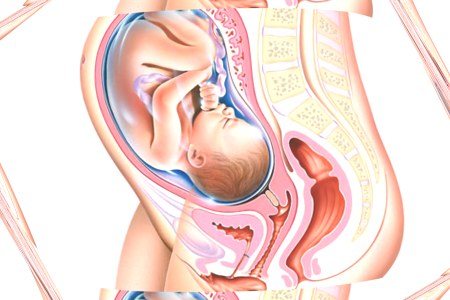
Possible dangers at 25 weeks of pregnancy
During this period, there is a danger of developing edema, which will have a negative impact on both the expectant mother and the fetus. To avoid this, it is recommended to limit your salt intake. A lack of vitamin D during this period of active bone formation can lead to rickets in a child. If the baby lacks calcium, the mineral is taken from the mother’s reserves, which leads to brittle bones, nails and teeth. For the same reason, exacerbation of hemorrhoids is possible, which is also negatively affected by swelling and increased volume of circulating blood.
Any changes in the nature of the discharge (change in color, smell, itching or lumps) may indicate infection and are a reason to urgently consult a doctor. Having determined the nature of the infection, the gynecologist will prescribe the correct treatment to get rid of the disease before delivery. An increased amount of discharge may also occur as a result of leakage of amniotic fluid. In this case, you should immediately consult a doctor.
A pregnant woman's belly is already quite large, and the baby and amniotic fluid add several kilograms of stress to the spine. Because of this, a woman may have pain in her back, legs, or shortness of breath. The active growth of the uterus leads to stretching of the skin, so small stretch marks may already appear. You can prevent their occurrence with special cosmetics that are sold in every pharmacy. Regular use of such creams and oils will increase skin elasticity and provide it with sufficient hydration and protection.
Poor nutrition can lead to the development of anemia, which is very dangerous for the baby. To ensure that the amount of hemoglobin is sufficient and it can fully provide the fetus with oxygen, it is recommended to eat veal and buckwheat.
When diet correction does not produce the desired results, the gynecologist prescribes drug treatment, since this symptom cannot be left unattended.
Belly at 25 weeks of pregnancy: tugs, hurts
The uterus continues to increase in size, and therefore the tension of the muscles that hold it continues. This becomes the cause of periodic pain that can occur in the abdominal area from time to time. More often they accompany individual movements: sharp turns, getting out of bed or chair, coughing, sneezing.
Discomfort in the form of mild cramping sensations in the abdomen can also be caused by training, false contractions, through which the uterus prepares for the upcoming birth. In this case, cramping pain is not severe, occurs sporadically and passes quickly.
But if your stomach hurts, feels tight, contractions become regular, intensify and become more frequent, you must immediately go to the hospital or call an ambulance. Painful regular contractions with a certain frequency, with the separation of blood or the appearance of a large amount of liquid watery discharge, are a sign of the onset of premature labor.
By the way, abdominal pain can also be associated with a common phenomenon among pregnant women - irregular bowel movements, impaired digestive function, constipation. To avoid these, you should follow an optimal diet, including in the menu foods rich in fiber, laxative prunes, beets, and olive oil.


